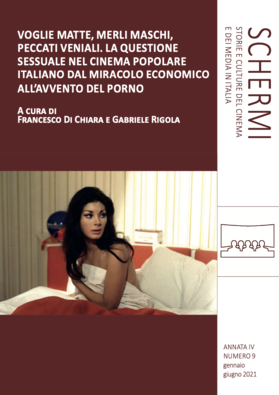Verso una memoria culturale autoassolutoria. Ruoli di genere e mascolinità nel "combat film" italiano degli anni Cinquanta
DOI:
https://doi.org/10.13130/2532-2486/14188Parole chiave:
Postwar Italian cinema, Masculinity, Trauma studies, Memory studies, Combat filmAbstract
In the present essay, I will take into account some Italian war films made in the 1950s, such as “Carica eroica” (“Heroic Charge”, 1952, Francesco De Robertis), “I sette dell’Orsa maggiore” (“Hell Raiders of the Deep”, 1953, Duilio Coletti), “Mizar - Sabotaggio in mare” (Mizar, 1954, Francesco De Robertis), “Divisione Folgore” (“Folgore Division“, 1954, Duilio Coletti), “La grande speranza” (“Submarine Attack”, 1954, Duilio Coletti) in order to reflect upon their role in building Italy’s memory of its past as well as the perception of Italian war crimes in public opinion. These productions extend a unifying narrative of the war, consolidating the myth of the “good Italian” (“italiani brava gente”). Through the inclusion of the soldier in collective memory by silencing his role as aggressor, Italian combat films participated and consolidated the process of collective amnesia about the fascist regime and how they influenced the way in which Italian viewers constructed a shared sense of the past.
Downloads
Dowloads
Pubblicato
Come citare
Fascicolo
Sezione
Licenza
Gli autori che pubblicano su questa rivista accettano le seguenti condizioni:
- Gli autori mantengono i diritti sulla loro opera e cedono alla rivista il diritto di prima pubblicazione dell'opera, contemporaneamente licenziata sotto una Licenza Creative Commons - Attribuzione - Condividi allo stesso modo- che permette ad altri di condividere l'opera indicando la paternità intellettuale e la prima pubblicazione su questa rivista.
- Gli autori possono aderire ad altri accordi di licenza non esclusiva per la distribuzione della versione dell'opera pubblicata (es. depositarla in un archivio istituzionale o pubblicarla in una monografia), a patto di indicare che la prima pubblicazione è avvenuta su questa rivista.
- Gli autori possono diffondere la loro opera online (es. in repository istituzionali o nel loro sito web) prima e durante il processo di submission, poichè può portare a scambi produttivi e aumentare le citazioni dell'opera pubblicata (Vedi The Effect of Open Access).





